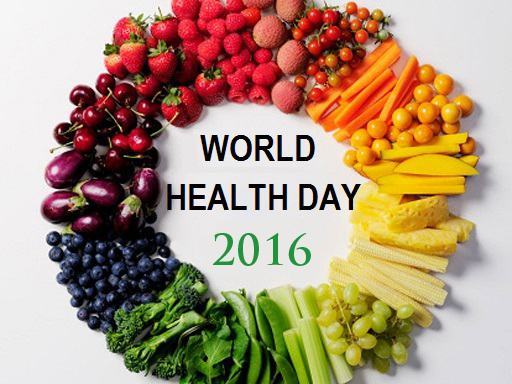The World Health Day is celebrated annually on the 7th of April. The World Health Assembly celebrates this day to draw people’s attention towards the importance of global health.

In 2016, the aim of World Health Day is to create awareness about Diabetes. The largely preventable and treatable non-communicable disease is rapidly increasing. The numbers are high in many countries, most dramatically in low- and middle-income countries. Simple lifestyle measures have been shown to be effective in preventing or delaying the onset of the disease. Maintaining normal body weight, engaging in regular physical activity, and eating a healthy diet are the most achievable preventive methods. Diabetes can be controlled and managed to prevent complications through diagnosis, self-management education, and affordable treatment.
Background
The World Health Organization (WHO) is an agency of the United Nations that is responsible for the public health of the World. The WHO has a constitution that countries involved in the United Nations have agreed to promote the general health of the globe.
Established in 1950, World Health Day has a theme each year to draw attention to a current world health issue.
Why is World Health Day celebrated?
- To increase the public awareness of various causes and prevention of diseases.
- To provide detail knowledge of getting prevented from various diseases and their complications.
- To encourage most vulnerable group of people to frequently check their blood pressure and follow medications from the professionals.
- To promote self-care among people.
- To motivate the worldwide health authorities to make their own efforts in creating the healthy environments in their country.
- To protect families living in the disease vulnerable areas.
- To teach travelers and send them a messages about how to get protected from the vector-borne diseases while travelling.
World Health Day 2016
An estimated 347 million people in the world have diabetes and the occurrence is growing, particularly in low- and middle-income countries.
In 2012, the disease was the direct cause of some 1.5 million deaths, with more than 80% of those occurring in low- and middle-income countries. WHO projects that diabetes will be the 7th leading cause of death by 2030.
Diabetes is a chronic disease. It occurs either when the pancreas does not produce enough insulin or when the body cannot effectively use the insulin it produces. Insulin is a hormone that regulates blood sugar which gives us the energy for the body to function. If blood sugar cannot get into the cells to be burned as energy, sugar builds up to harmful levels in the blood.
There are 2 main forms of the diabetes. People with type 1 diabetes typically make none of their own insulin and therefore require insulin injections to survive. People with type 2 diabetes, the form that comprises some 90% of cases, usually produce their own insulin, but not enough or they are unable to use it properly.
Over time, high blood sugar can seriously compromise every major organ system in the body, causing heart attacks, strokes, nerve damage, kidney failure, blindness, impotence and infections that can lead to amputations.
World Health Day 2016: Key messages
The World Health Day, on 7 April 2016, focuses on diabetes because:
- The diabetes epidemic is rapidly increasing in many countries, with the documented increase most dramatic in low- and middle-income countries.
- A large proportion of diabetes cases are preventable. Simple lifestyle measures have been shown to be effective in preventing or delaying the onset of type 2 diabetes. Maintaining normal body weight, engaging in regular physical activity, and eating a healthy diet can reduce the risk of diabetes.
- Diabetes is treatable. Diabetes can be controlled and managed to prevent complications. Increasing access to diagnosis, self-management education and affordable treatment are vital components of the response.
- Efforts to prevent and treat diabetes will be important to achieve the global Sustainable Development Goal 3 target of reducing premature mortality from non-communicable diseases (NCDs) by one-third by 2030. Many sectors of society have a role to play, including governments, employers, educators, manufacturers, civil society, private sector, the media and individuals themselves.
The main goals of the World Health Day 2016 campaign are:
- Increase awareness about the rise in diabetes, and its staggering burden and consequences, in particular in low-and middle-income countries.
- Initiate a set of specific, effective and affordable actions to fight diabetes. These will include steps to prevent, treat and care for people with diabetes.
- Launch the first Global report on diabetes, which will describe the burden and consequences of diabetes and advocate for stronger health systems to ensure improved surveillance, enhanced prevention, and more effective management of diabetes.
